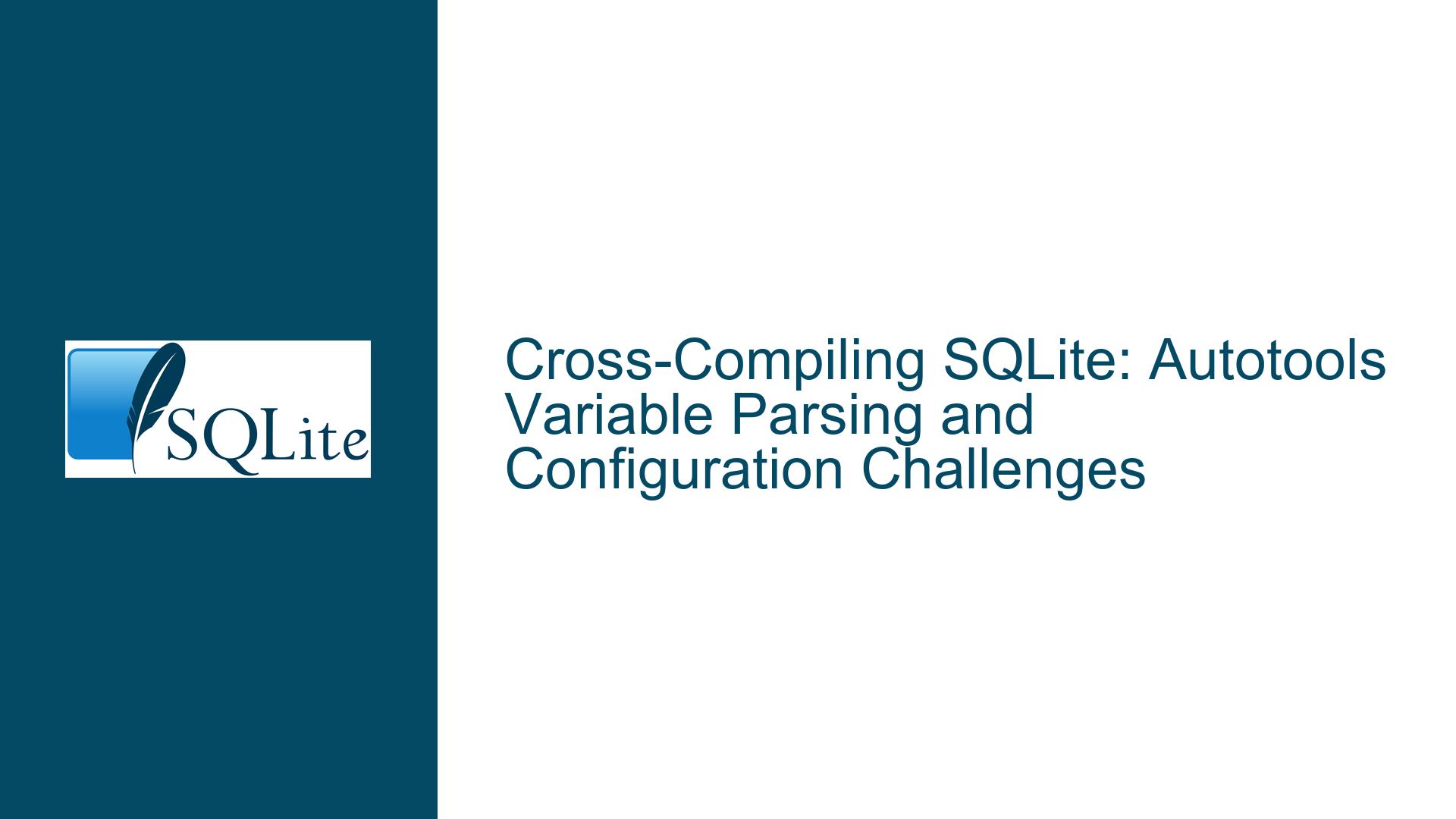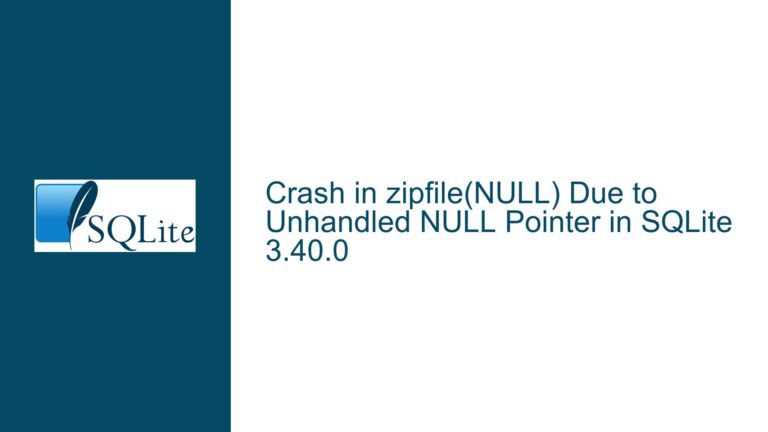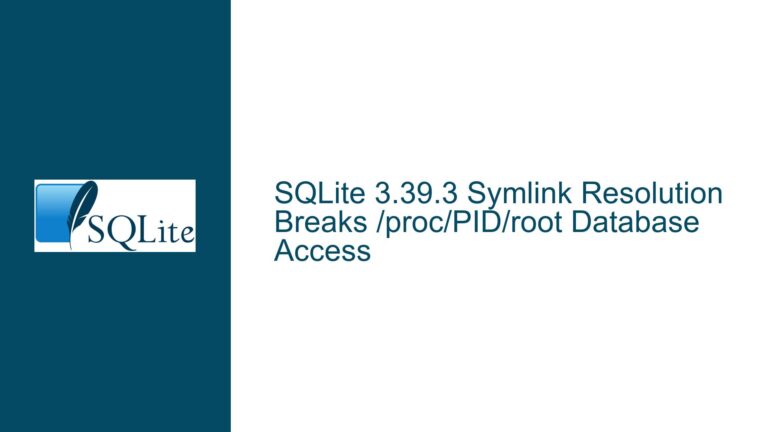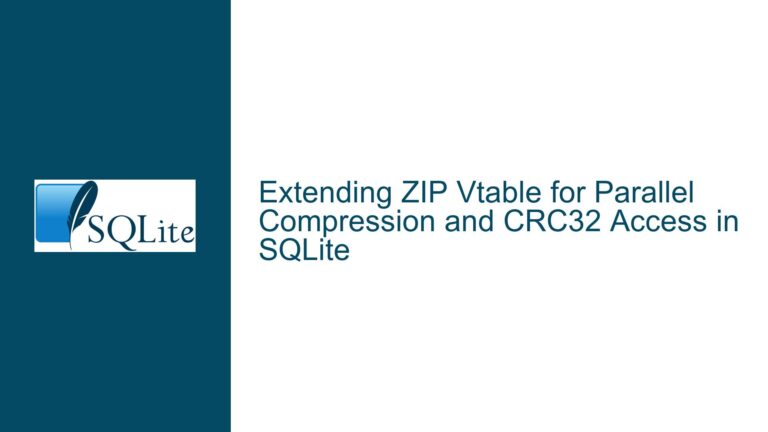Cross-Compiling SQLite: Autotools Variable Parsing and Configuration Challenges
Issue Overview: Autotools Variable Parsing and Cross-Compilation Configuration
The core issue revolves around the challenges faced when attempting to cross-compile SQLite using the GNU Autotools build system. The primary concern is whether the configure script is correctly parsing and applying user-defined variables, such as HAVE_TCL, SQLITE_OS_WIN, SQLITE_OS_WINNT, SQLITE_USE_MALLOC_H, and SQLITE_USE_MSIZE. The user, Alan, is attempting to compile SQLite for a Windows target (x86_64-w64-mingw32) from a Linux host (x86_64-pc-linux-gnu). Despite passing these variables to the configure script, the generated config.log indicates that some variables, like HAVE_TCL and SQLITE_OS_WIN, are not being set as expected. This discrepancy raises questions about how Autotools handles user-defined variables and whether the SQLite build system is designed to support cross-compilation in this manner.
The discussion highlights several key points:
- The
configurescript does not seem to honor user-defined variables likeSQLITE_OS_WINandHAVE_TCLas expected. - The
--disable-tclflag overrides any value passed toHAVE_TCL, setting it to an empty string. - The SQLite build system, as implemented with Autotools, is primarily designed for native builds and may not fully support cross-compilation scenarios.
- Compiler defines and flags are typically handled by
make, notconfigure, which complicates the process of passing custom compilation flags.
This issue is further complicated by the fact that the SQLite build system does not explicitly reference some of the variables being passed (e.g., SQLITE_USE_MALLOC_H and SQLITE_USE_MSIZE), making it unclear whether they are being processed at all. The discussion also touches on the broader challenges of using Autotools for cross-compilation, particularly when the build system is not explicitly designed for such use cases.
Possible Causes: Misconfigured Autotools and Build System Limitations
The root causes of the issue can be traced to several factors, including the behavior of the Autotools system, the design of the SQLite build system, and the inherent complexities of cross-compilation.
Autotools Variable Handling: The
configurescript generated by Autotools is designed to handle a specific set of predefined variables and flags. User-defined variables, such asSQLITE_OS_WINandHAVE_TCL, are not automatically processed unless explicitly referenced in theconfigure.acorMakefile.amfiles. In the case of SQLite, theconfigure.acfile explicitly sets variables likeHAVE_TCLbased on the--disable-tclflag, overriding any user-provided values. This behavior is consistent with Autotools’ design, which prioritizes internal logic over external inputs unless explicitly configured otherwise.Cross-Compilation Challenges: Cross-compiling SQLite introduces additional complexity because the build system is primarily designed for native compilation. The
configurescript relies on feature detection and platform-specific logic, which may not function correctly when targeting a different platform. For example, the script setsSQLITE_OS_UNIXto1by default, even when cross-compiling for Windows, because it assumes the build platform is the target platform. This assumption breaks down in cross-compilation scenarios, leading to incorrect variable settings.Compiler and Linker Flags: The
configurescript is not responsible for passing compiler and linker flags directly to the build process. Instead, these flags are typically handled bymakeusing environment variables likeCFLAGSandLDFLAGS. This separation of concerns means that user-defined variables passed toconfiguremay not propagate to the compilation stage unless explicitly handled by the build system. In the case of SQLite, variables likeSQLITE_USE_MALLOC_HandSQLITE_USE_MSIZEare not referenced in theconfigure.acfile, making it unclear whether they are being processed at all.Lack of Documentation and Testing: The SQLite build system does not provide extensive documentation or testing for cross-compilation scenarios. This lack of guidance makes it difficult for users to determine whether their configuration is correct or whether the build system supports their use case. Additionally, the absence of explicit references to certain variables in the
configure.acfile suggests that they may not be intended for use with Autotools, further complicating the issue.
Troubleshooting Steps, Solutions & Fixes: Addressing Variable Parsing and Cross-Compilation Issues
To resolve the issues outlined above, several troubleshooting steps and solutions can be employed. These steps focus on understanding the behavior of the Autotools system, modifying the build configuration, and leveraging alternative approaches to achieve the desired outcome.
Review and Modify
configure.ac: The first step is to examine theconfigure.acfile to understand how variables likeHAVE_TCLandSQLITE_OS_WINare handled. If these variables are not being set as expected, they can be explicitly defined in theconfigure.acfile. For example, the following code snippet can be added to ensure thatSQLITE_OS_WINis set correctly:AC_ARG_ENABLE([sqlite-os-win], [AS_HELP_STRING([--enable-sqlite-os-win], [Enable Windows-specific features])], [SQLITE_OS_WIN=$enableval], [SQLITE_OS_WIN=0] ) AC_SUBST(SQLITE_OS_WIN)This modification allows the
configurescript to accept the--enable-sqlite-os-winflag and set theSQLITE_OS_WINvariable accordingly.Pass Compiler Flags via
CFLAGS: Since theconfigurescript does not handle compiler defines directly, they can be passed using theCFLAGSenvironment variable. For example, the following command setsSQLITE_OS_UNIXto1and includes additional optimization flags:./configure CFLAGS="-O2 -DSQLITE_OS_UNIX=1"This approach ensures that the compiler receives the necessary defines without relying on the
configurescript to process them.Use a Custom
Makefile: If the Autotools build system proves too restrictive, a customMakefilecan be created to handle the compilation process. This approach bypasses theconfigurescript entirely, allowing for greater control over the build process. For example, the followingMakefilesnippet sets the necessary variables and compiles SQLite for a Windows target:CC = x86_64-w64-mingw32-gcc CFLAGS = -O2 -DSQLITE_OS_WIN=1 -DSQLITE_OS_WINNT=1 -DSQLITE_USE_MALLOC_H=1 -DSQLITE_USE_MSIZE=1 LDFLAGS = -static all: sqlite3.c $(CC) $(CFLAGS) $(LDFLAGS) -o sqlite3.exe sqlite3.cThis
Makefileexplicitly sets the compiler, flags, and target, ensuring that the build process adheres to the desired configuration.Leverage Cross-Compilation Tools: Cross-compilation tools like
mingw-w64provide preconfigured environments for building Windows binaries on Linux. These tools often include wrapper scripts that simplify the configuration and compilation process. For example, the following command usesmingw-w64to cross-compile SQLite:x86_64-w64-mingw32-configure --disable-tcl x86_64-w64-mingw32-makeThis approach abstracts away many of the complexities associated with cross-compilation, making it easier to achieve the desired outcome.
Consult SQLite Documentation and Community: The SQLite documentation and community forums can provide valuable insights into the build process and potential pitfalls. For example, the SQLite website includes a page dedicated to compiling SQLite for Windows, which may offer guidance on cross-compilation. Additionally, the SQLite mailing list and forums are frequented by experienced users who can provide advice and troubleshooting assistance.
Test and Validate the Build: After making modifications to the build configuration, it is essential to test and validate the resulting binaries. This step ensures that the changes have the intended effect and that the compiled SQLite library functions correctly on the target platform. For example, the following command tests the compiled SQLite binary on a Windows system:
wine sqlite3.exe :memory: "SELECT sqlite_version();"This command uses
wine, a compatibility layer for running Windows applications on Linux, to execute the compiled SQLite binary and verify its functionality.
By following these troubleshooting steps and solutions, users can address the challenges associated with cross-compiling SQLite using Autotools. While the process may require significant effort and experimentation, the resulting knowledge and experience can prove invaluable for future projects.






